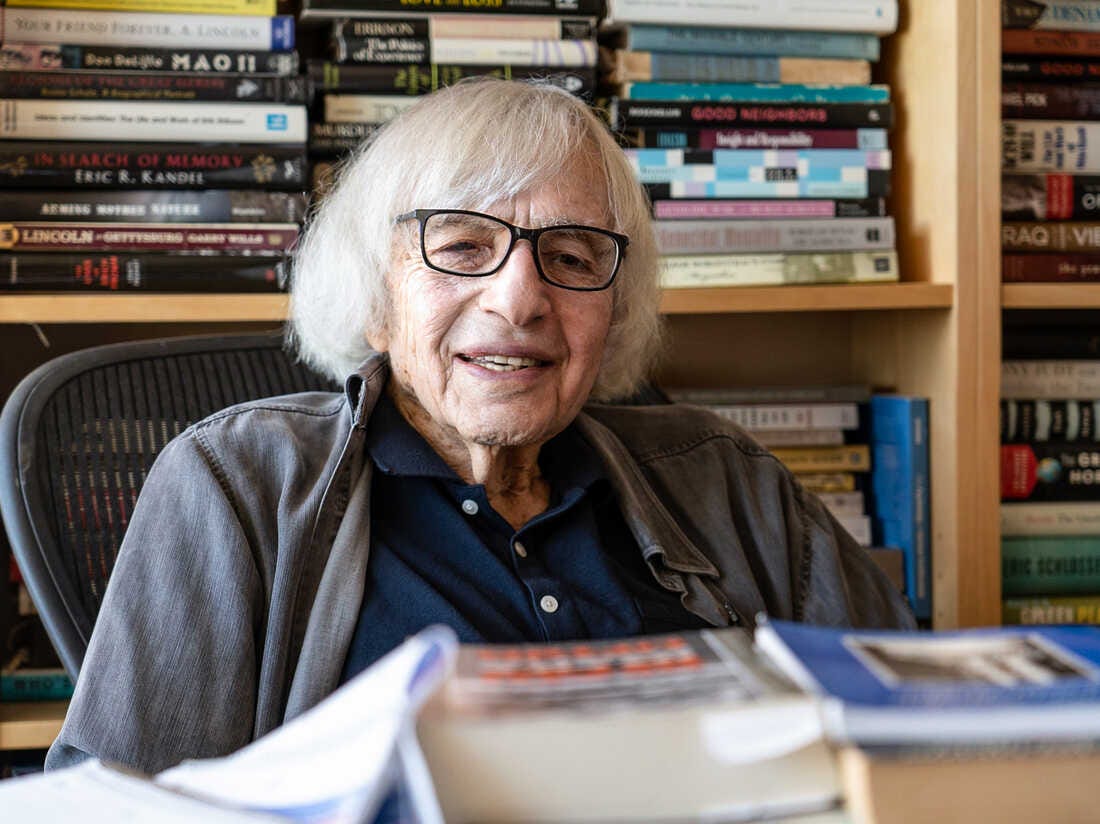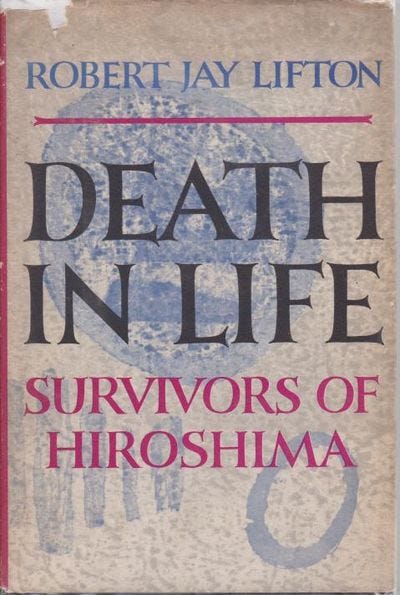Reprinted with permission from Greg Mitchell’s newsletter Oppenheimer: From Hiroshima to Hollywood.

I was pleased on Sunday to find The New Yorker online posting at the top of its site a massive Q & A that finds Masha Gesssen interviewing one of my longtime mentors and heroes, Robert Jay Lifton, at age 97. We first met exactly 40 years ago when, as the editor of Nuclear Times magazine, I coaxed him into writing a piece for us. I knew his work from his National Book Award winner on Hiroshima survivors, Death in Life, and then Nazi Doctors. A few years later he hired me to help run his Center for Human Survival in NYC and we also began a long annual tradition of attending baseball games between my Mets and his boyhood hometown (Brooklyn now L.A.) Dodgers.
Oh, we then co-authored numerous articles and a classic bestseller Hiroshima in America in 1995 – with brilliant sections on Oppenheimer and Truman, and a few years later the acclaimed Who Owns Death?, on capital punishment in the U.S. (feel free to order either ot them). We co-wrote pieces for more than a dozen publications, ranging from TV Guide to The New York Times. I started attending his famous Wellfleet gatherings each autumn. Remained friends and writing partners ever since – also attended several Beethoven concerts – and he is still going strong at 97, with yet another new book, Surviving Our Catastrophes, which inspired the New Yorker piece.
Gessen traveled to Truro on the Cape for the interview, in the home he shares with political scientist and partner Nancy Rosenblum. We make that visit to that home almost every year ourselves, though missed out this year. Of course, he also helped inspire my book and current PBS film, Atomic Cover-up (you can now watch it for free).
The lengthy interview touches on all sorts of vital areas. Gessen opens by asking about the meaning of several key phrases that Lifton devised and have since entered the (political or psychological) discourse, such as “psychic numbing” and “atrocity-producing situation.” They then discuss the Trump cult, his political activism, the potential apocalypse of climate change, but also his love for sports, his daily routine and why he retains his long-standing hopefulness in a dark time.
Asked about the Nolan movie “Oppenheimer,” he replies:
I thought it was a well-made film by a gifted filmmaker. But it missed this issue of nuclearism. It missed the Bohr-Oppenheimer interaction. And worst of all, it said nothing about what happened in Hiroshima. It had just a fleeting image of his thinking about Hiroshima. My view is that his success in making the weapon was the source of his personal catastrophe. He was deeply ambivalent about his legacy. I’m very sensitive to that because that was how I got to my preoccupation with Oppenheimer: through having studied Hiroshima, having lived there for six months, and then asking myself, What happened on the other side of the bomb – the people who made it, the people who used it? They underwent a kind of numbing.
It’s also true that Oppenheimer, in relationship to the larger hydrogen bombs, became the most vociferous critic of nuclearism. That’s part of his story. The moral of Oppenheimer’s story is that we need abolition. That’s the only human solution.
That brings us to “malignant normality.”
It describes a situation that is harmful and destructive but becomes routinized, becomes the norm, becomes accepted behavior. I came to that by looking at malignant nuclear normality. After the Second World War, the assumption was that we might have to use the weapon again. At Harvard’s Kennedy School of Government, a group of faculty members wrote a book called “Living with Nuclear Weapons.” There was a book by Joseph Nye called “Nuclear Ethics.” His “nuclear ethics” included using the weapon. Later there was Star Wars, the anti-missile missiles which really encouraged first-strike use. These were examples of malignant nuclear normality. Other examples were the scenarios by people like [the physicists] Edward Teller and Herman Kahn in which we could use the weapons and recover readily from nuclear war. We could win nuclear wars.
How does that relate to another one of your concepts, nuclearism?
Nuclearism is the embrace of nuclear weapons to solve various human problems and the commitment to their use. I speak of a strange early expression of nuclearism between Oppenheimer and Niels Bohr, who was a great mentor of Oppenheimer. Bohr came to Los Alamos. And they would have abstract conversations. They had this idea that nuclear weapons could be both a source of destruction and havoc and a source of good because their use would prevent any wars in the future. And that view has never left us. Oppenheimer never quite renounced it, though, at other times, he said he had blood on his hands—in his famous meeting with Truman.
By abolition, you mean destruction of all existing weapons?
Yes, and not building any new ones.

Have you been following the war in Ukraine? Do you see Putin as engaging in nuclearism?
I do. He has a constant threat of using nuclear weapons. Some feel that his very threat is all that he can do. But we can’t always be certain. I think he is aware of the danger of nuclear weapons to the human race. He has shown that awareness, and it has been expressed at times by his spokesman. But we can’t ever fully know. His emotions are so otherwise extreme.
There’s a messianic ideology in Russia. And the line used on Russian television is, “If we blow up the world, at least we will go straight to Heaven. And they will just croak.”
There’s always been that idea with nuclearism. One somehow feels that one’s own group will survive and others will die. It’s an illusion, of course, but it’s one of the many that we call forth in relation to nuclear danger.
Are you in touch with any of your former Russian counterparts in the anti-nuclear movement?
I’ve never entirely left the anti-nuclear movements. I’ve been particularly active in Physicians for Social Responsibility. We had meetings – or bombings, as we used to call it – in different cities in the country, describing what would happen if a nuclear war occurred. We had a very simple message: we’re physicians and we’d like to be able to patch you up after this war, but it won’t really be possible because all medical facilities will be destroyed, and probably you’ll be dead, and we’ll be dead. We did the same internationally with the International Physicians for the Prevention of Nuclear War, which won the Nobel Peace Prize.
Next term: “witnessing professional.”
I went to Hiroshima because I was already anti-nuclear. When I got there, I discovered that, seventeen years after the bomb was dropped, there had been no over-all, inclusive study of what happened to that city and to groups of people in it. I wanted to conduct a scientific study, having a protocol and asking everyone similar questions – although I altered my method by encouraging them to associate. But I also realized that I wanted to bear witness to what happened to that city. I wanted to tell the world. I wanted to give a retelling, from my standpoint, as a psychological professional, of what happened to that city. That was how I came to see myself as a witnessing professional. It was to be a form of active witness.
There were people in Hiroshima who embodied the struggle to bear witness. One of them was a historian who was at the edge of the city who said, “I looked down and saw that Hiroshima had disappeared.” That image of the city disappearing took hold in my head and became central to my life afterward. And the image that kept reverberating in my mind was, one plane, one bomb, one city. I was making clear – at least to myself at first and then, perhaps, to others – that bearing witness and taking action was something that we needed from professionals and others.

Cross-posted, with small changes, from my “other” newsletter, Between Rock and a Hard Place.
Thanks for reading Oppenheimer and the Legacy of His Bomb ! Subscribe for free to receive new posts and support my work.
Greg Mitchell is the author of a dozen books, including “Hiroshima in America,” and the recent award-winning The Beginning or the End: How Hollywood – and America – Learned to Stop Worrying and Love the Bomb, and has directed three documentary films since 2021, including two for PBS (plus award-winning “Atomic Cover-up”). He has written widely about the atomic bomb and atomic bombings, and their aftermath, for over forty years. He writes often at Oppenheimer: From Hiroshima to Hollywood.
